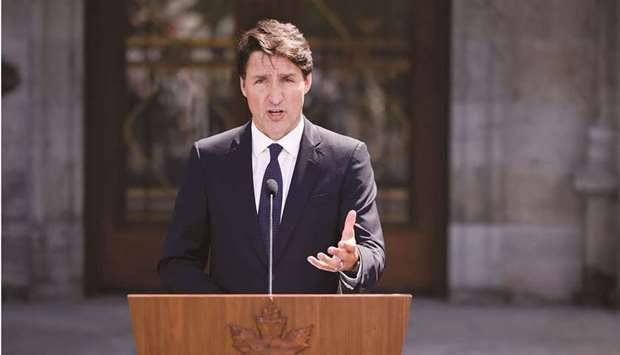Canadian Prime Minister Justin Trudeau has announced snap elections for September 20 to seek a new mandate to steer the nation’s coronavirus (Covid-19) pandemic exit, much to the dismay of his rival parties.
Despite rolling out massive pandemic aid, passing a federal budget and other key legislation with opposition backing over the past year, Trudeau – in office since 2015 – has lamented that parliament has become dysfunctional.
The election comes at a “pivotal, consequential moment” for Canada, Trudeau said.
“We will be taking decisions that will last not just for the coming months but for the coming decades. Canadians deserve their say. That’s exactly what we’re going to give them,” he told reporters.
The prime minister met Governor-General Mary Simon, the representative of head of state Queen Elizabeth, yesterday to ask her to dissolve parliament, triggering a general election that polling shows is likely to return his Liberals to power.
“Canadians need to choose how we finish the fight against Covid-19 and build back better – from getting the job done on vaccines, to having people’s backs all the way through to the end of this crisis,” Trudeau said after the meeting.
All five parties currently holding seats in parliament are gearing up for a fierce battle at the ballot box.
Most Canadians approve of Trudeau’s pandemic response.
However, if a fourth wave of Covid-19 infections strikes during the campaign, it could hurt his backing.
“This was the only window of opportunity for him because with students’ return to school and universities in two weeks, Covid-19 cases will inevitably go up,” Felix Mathieu, political science professor at the University of Winnipeg, told AFP.
Trudeau’s government “has already held for 18 months, which is the average lifespan for a minority government”, he added.
Despite rising vaccination rates that are among the highest in the world – with almost 62% of Canadians fully inoculated – nearly 1,000 new daily Covid-19 cases have been reported across Canada recently.
Trudeau was re-elected to office in 2019 but lost his majority in his second term, amid scandals.
To regain a majority on September 20, the Liberals must win at least 170 of the 338 seats in the House of Commons, up 15 seats from its current standing.
According to a recent Abacus Data poll, the Liberals are in striking distance of a majority, with 37% of support.
The Conservatives and the leftist New Democrat Party – which propped up the Liberals until now and has seen an uptick in support – trail on 28% and 20%, respectively.
Trudeau’s main challenger, Conservative leader Erin O’Toole, meanwhile, has struggled to find his footing since becoming leader of the Conservatives in August 2020, as lockdowns and other public health measures put glad-handing out of reach.
In March, he found himself painfully at odds with his rank-and-file after telling a party convention that a robust plan to tackle climate change was needed if the Conservatives ever hoped to unseat Trudeau.
Members instead voted down a resolution that said “climate change is real”.
Campaigning is to last only 36 days and is largely expected to revolve around pandemic management, the government’s broad emergency aid programmes, and a three-year C$101.4bn ($80.9bn) post-pandemic stimulus plan.
The Conservatives and New Democrats have in recent days condemned the idea of an early election, saying that there was no need for it, and describing the call as a power grab.
In late July, the New Democratic leader, Jagmeet Singh, sent a letter to then newly-installed Governor-General Simon, calling on her to reject Trudeau’s request to dissolve parliament.
Singh pointed out that the country’s fixed-election law states that every general election must be held on the third Monday of October, four calendar years after the last one.
While the law allows for an early election if the government has lost the confidence of the House of Commons, Singh noted that Trudeau’s Liberals have won every confidence vote they faced.
“It’s not the right time to have an election,” he said earlier this week. “People might say ‘that that’s what governments do’ … I don’t think that’s what governments do when you’re in the middle of a pandemic,” he said.
“Canadians are worried about a fourth wave of Covid-19 … now is not the time for an election. We can all wait and go to the polls when it’s safe,” Conservative leader O’Toole said in a video released on social media this week.
“This is a really important moment,” Trudeau said yesterday when asked repeatedly why he was calling an election during a pandemic.
He said some Conservative legislators had described as “tyrannical” the government’s push to make vaccinations mandatory for federally regulated industries.
“The answer to tyranny is to have an election,” he said.
The right-of-centre Conservatives have warned that spending will increase if Trudeau wins again, leaving generations of Canadians hobbled by debt.
With a parliamentary majority, Trudeau would have a free hand to follow through on his stated policy priorities of fighting climate change and supporting those who suffered most during the pandemic.
“Our planet and our future are at stake. So I need you alongside me in this fight,” the prime minister said yesterday.
Trudeau, the son of longtime former prime minister Pierre Trudeau, first won a majority in 2015.
But in the 2019 election, after decades-old black face pictures surfaced, he came up short of a majority.
Another minority administration would leave him likely relying once more on the New Democrats, who favour even heavier spending on social programmes.
It would also raise questions about Trudeau’s future as the leader of his party.
Yesterday Trudeau repeatedly refused to say if he would resign as leader if he does not secure a majority in the vote.

Canadian Prime Minister Justin Trudeau: We will be taking decisions that will last not just for the coming months, but for the coming decades. Canadians deserve their say. That’s exactly what we’re going to give them.
